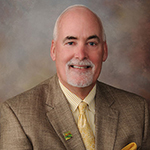Porterville College president happy to be back in Central Valley where she achieved her American dream
Porterville College president happy to be back in Central Valley where she achieved her American dream
Being a college president was never a position Claudia Habib thought she would fill. Her career, much like her life, has been an evolution with no specific end position or goal in mind.
She came to the United States from Colombia with no English under her belt, and to make ends meet, she cleaned homes and offices.
Three decades later, she is Porterville College’s newest president.
“I’m in a place 30 years ago I never dreamed of,” she said.
When she first arrived to the United States, she landed in the Central Valley. Through community college, she learned how to speak English, and she earned a bachelor’s degree in interior design from Fresno State.
One of the best parts of her newest position, which she officially assumed on Monday, has been being back in the area where it all started.
“Being an immigrant who landed here where I achieved my American dream, I’m grateful for that, to be able to serve this community,” she said.
She was a designer for eight years, but decided to switch to education. She taught for 12 years and saw, through interactions with students, how her own story helped her better understand what many were going through.
“You go through that and think it’s your life and luck, but 10 years later, seeing students having similar challenges and how I could help them, that’s what led me to look at an administrative position,” she said. “It’s been an evolution.”
She later earned a master’s degree in instructional technology from National University and an Ed.D. in education and leadership from Fresno State.
She has served as interim dean of instruction of fine, performing and communication arts at Fresno City College, as well as interim dean of instruction of agriculture/natural resources, manufacturing and business and vice president of student services at Reedley College.
Most recently, she was the vice president of Madera and Oakhurst Community College Centers in Madera. With each administrative role she has taken on, she said she learned how to make a difference in students’ lives even though she was not in the classroom.
In her newest role, her main priority is to listen, learn about the campus as much as she can and preserve its longstanding legacy. She also understands budget constraints may lead to some changes.
“We’re always looking at ways to better our students, and we’ll tackle that with our talented faculty and staff. My job is to support those efforts and advocate for those students,” she said. “Navigating the budget constraints is something we do together as a district and that we don’t sacrifice the services we provide to students. I’m here not to change for change sake, but observing and learning the culture.”
She is looking forward to seeing the completion of several Measure J construction projects taking place on campus and higher enrollment numbers in coming years. This past school year saw its largest graduating class yet with 1,001 degrees handed out. In 2018, there were 725.
Working with the other Kern Community College District campus presidents — Bakersfield College’s Sonya Christian and Cerro Coso Community College’s Jill Board — also is a perk. “They’re doing great things,” she said.
Though she herself never thought she would be a president, her colleagues say otherwise.
“She’s very hardworking, she’s very dedicated to the community and students. Many times it would be 8:30 or 9 p.m. and she was just leaving to go home,” said Monica Armenta, Habib’s executive assistant at Madera. “When we were together at Fresno, I told her that she would probably be president at Fresno City.”
“When I found out she was going to interview, I knew for sure they were taking her away from us. We lost her,” she added.
But perhaps her biggest advantage is that she recognizes what programs and resources students need.
“Sometimes we forget that for immigrants, they’re leaving behind their country, family, friends and part of their heart. It’s a difficult decision,” she said. “I am respectful of the practices that need to take place, but we need to approach our work with passion and humanity.”
Habib succeeds former President Rosa Flores Carlson, who retired in spring 2018, and interim President Bill Henry, who retired in June.
Original Post can be found at :https://www.bakersfield.com/news/porterville-college-president-happy-to-be-back-in-central-valley/article_a0f20810-a271-11e9-9b64-8b10b414af07.html


